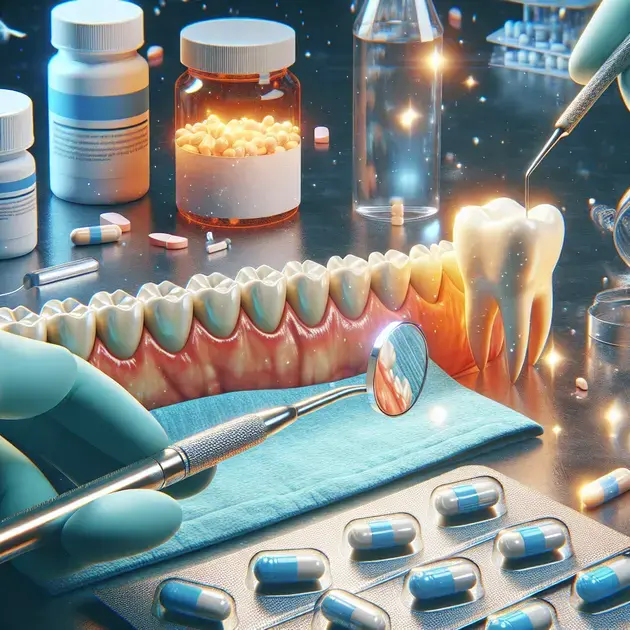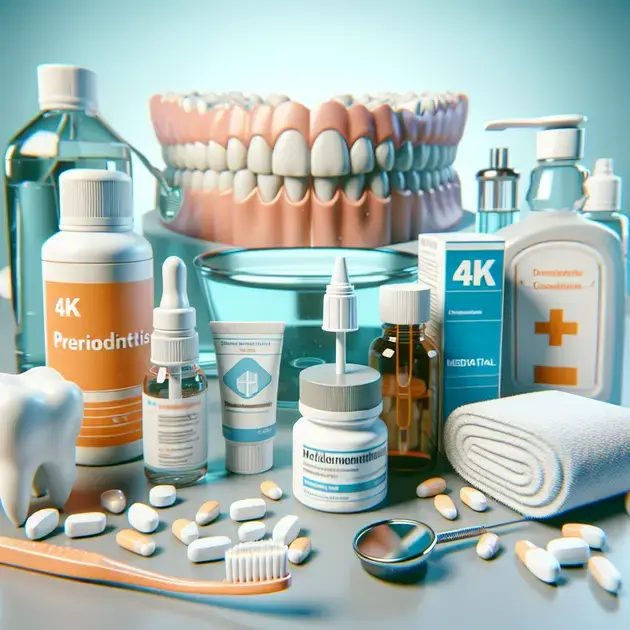When it comes to treating periodontitis, finding the right medication is crucial. In this comprehensive guide, we will explore the most effective medications available for combating this common oral health issue.
Periodontitis can be a serious condition that affects the gums and bone supporting the teeth. With the advancement in dental research, there are now several medications that have shown promising results in treating and managing periodontitis effectively.

Effective Medication Options for Periodontitis Treatment
Periodontitis is a severe gum infection that damages the soft tissue and destroys the bone that supports your teeth. If left untreated, it can lead to tooth loss and other health problems. Fortunately, there are effective medication options available to treat periodontitis and prevent further complications.
One promising solution for managing periodontitis is the use of prescription antimicrobial mouthwashes. These mouthwashes contain ingredients that help reduce the bacteria in your mouth, minimizing the progression of the infection. Examples of antimicrobial mouthwashes include Listerine Antiseptic Mouthwash and Colgate Peroxyl Mouth Sore Rinse.
Another effective medication for treating periodontitis is antibiotic therapy. In some cases, your dentist may prescribe antibiotics to help control the infection and promote healing. Common antibiotics used for periodontitis treatment include doxycycline, minocycline, and metronidazole.
It’s essential to follow your dentist’s instructions carefully when using these medications to ensure the best results. Make sure to complete the full course of treatment as prescribed and attend follow-up appointments to monitor your progress.
Understanding the Impact of Periodontitis on Oral Health
Periodontitis can have a significant impact on your oral health, affecting not only your teeth and gums but also your overall well-being. The inflammation caused by the infection can lead to gum recession, tooth sensitivity, and eventual tooth loss if not properly treated.
Furthermore, research has shown that periodontitis is linked to other health conditions such as heart disease, diabetes, and respiratory issues. The bacteria from the infected gums can enter the bloodstream and contribute to systemic health problems, making it crucial to address periodontitis promptly.
To understand the impact of periodontitis on oral health, it’s essential to schedule regular dental check-ups and cleanings. Your dentist can assess the health of your gums, identify any signs of periodontal disease, and recommend appropriate treatment options to prevent further complications.
Practicing good oral hygiene, such as brushing twice a day, flossing regularly, and using an antimicrobial mouthwash, can also help maintain gum health and reduce the risk of periodontitis development.
Exploring Promising Solutions for Managing Periodontitis
When it comes to managing periodontitis, there are several promising solutions that can help control the infection and prevent its progression. One of the key strategies is professional dental cleaning, also known as scaling and root planing.
During this procedure, your dentist or dental hygienist will remove the plaque and tartar buildup from your teeth and roots, allowing the gums to heal and reattach to the teeth properly. This deep cleaning can help prevent further damage caused by periodontitis and promote gum health.
In addition to professional cleanings, adopting a good oral care routine at home is essential for managing periodontitis. Proper brushing and flossing techniques, along with the use of antimicrobial products, can help reduce the bacteria in your mouth and support the healing process.
If necessary, your dentist may also recommend surgical interventions to address advanced cases of periodontitis. Procedures such as flap surgery, bone grafting, or tissue regeneration can help restore the health of your gums and prevent tooth loss.

Effective Management Strategies for Periodontitis
Periodontitis is a serious gum infection that damages the soft tissue and destroys the bone that supports your teeth. It can lead to tooth loss if not treated promptly and effectively. Here are some effective management strategies for periodontitis:
Regular Dental Check-ups
Visiting your dentist regularly for check-ups and cleanings is crucial in managing periodontitis. Your dentist can detect early signs of gum disease and provide appropriate treatment to prevent it from progressing.
Consistent Oral Hygiene
Practicing good oral hygiene habits such as brushing at least twice a day, flossing daily, and using an antibacterial mouthwash can help control the bacteria that cause gum disease.
Healthy Lifestyle Choices
Eating a balanced diet, avoiding tobacco products, and managing stress can also contribute to better gum health. A healthy lifestyle can boost your immune system and help in the management of periodontitis.
Professional Periodontal Treatment
For more advanced cases of periodontitis, undergoing professional treatments such as scaling and root planing, laser therapy, or periodontal surgery may be necessary to control the infection and restore gum health.
Antibiotics as Adjunct Therapy
In some cases, antibiotics may be prescribed by your dentist as adjunct therapy to help combat the bacteria causing the gum infection. It is essential to follow your dentist’s instructions carefully when taking antibiotics for periodontitis.
The Role of Antibiotics in Periodontitis Treatment
Antibiotics play a vital role in the treatment of periodontitis by helping to eliminate the bacteria that cause gum infection. When used in combination with other periodontal therapies, antibiotics can be effective in managing and controlling the progression of the disease.
Types of Antibiotics Used
There are several types of antibiotics commonly used in the treatment of periodontitis, including tetracycline, doxycycline, and metronidazole. These antibiotics can be prescribed in different forms such as pills, mouth rinses, or gels, depending on the severity of the infection.
Adjunctive Therapy
Antibiotics are often used as adjunctive therapy in combination with scaling and root planing or other periodontal procedures to achieve better outcomes. They help reduce inflammation, control infection, and promote healing of the gums.
Antibiotic Resistance
It is essential to use antibiotics judiciously and follow your dentist’s instructions to prevent antibiotic resistance. Overuse or misuse of antibiotics can lead to the development of resistant bacteria, making the treatment less effective in the long run.
Consultation with a Dentist
If you have been prescribed antibiotics for periodontitis, make sure to follow up with your dentist regularly to monitor your progress and adjust your treatment plan if necessary. Your dentist can assess the effectiveness of the antibiotics and make recommendations for ongoing care.
Optimizing Periodontitis Therapy Through Anti-inflammatory Drugs
Anti-inflammatory drugs can play a significant role in optimizing periodontitis therapy by reducing inflammation, controlling pain, and promoting healing of the gums. These drugs can be used in conjunction with other periodontal treatments to enhance the outcomes of gum disease management.
Types of Anti-inflammatory Drugs
Nonsteroidal anti-inflammatory drugs (NSAIDs) such as ibuprofen and aspirin are commonly used to manage inflammation and pain associated with periodontitis. These drugs can help reduce swelling and discomfort in the gums, making it easier to perform necessary dental procedures.
Topical Anti-inflammatory Agents
In some cases, your dentist may recommend using topical anti-inflammatory agents such as corticosteroids or antimicrobial mouth rinses to target specific areas of gum inflammation. These agents can provide localized relief and aid in healing the affected tissues.
Benefits of Anti-inflammatory Therapy
Optimizing periodontitis therapy with anti-inflammatory drugs can lead to faster recovery, reduced risk of complications, and improved overall oral health. By controlling inflammation, these drugs help create a more favorable environment for gum tissue healing and regeneration.
Combination Therapy
Combining anti-inflammatory drugs with other periodontal treatments such as scaling and root planing, laser therapy, or surgical interventions can enhance the effectiveness of the overall therapy plan. Your dentist will tailor the treatment approach to your specific needs to achieve the best results.
**
Conclusion
**
In conclusion, effective management strategies for periodontitis are crucial for preventing further damage to your oral health. Regular dental check-ups play a vital role in early detection and treatment of gum disease, while consistent oral hygiene habits help control bacterial growth. Adopting a healthy lifestyle can also boost your immune system and aid in managing periodontitis.
For more advanced cases, professional periodontal treatment such as scaling and root planing may be necessary to restore gum health. Antibiotics used as adjunct therapy can help combat gum infection but must be used judiciously to avoid antibiotic resistance. Consulting with your dentist regularly is essential to monitor progress and adjust treatment plans accordingly.
Furthermore, optimizing periodontitis therapy through anti-inflammatory drugs can lead to faster recovery and improved oral health outcomes. Combining anti-inflammatory drugs with other treatments can enhance the overall effectiveness of the therapy plan. By following these management strategies and therapies, individuals can better control and manage periodontitis for optimal oral health.



